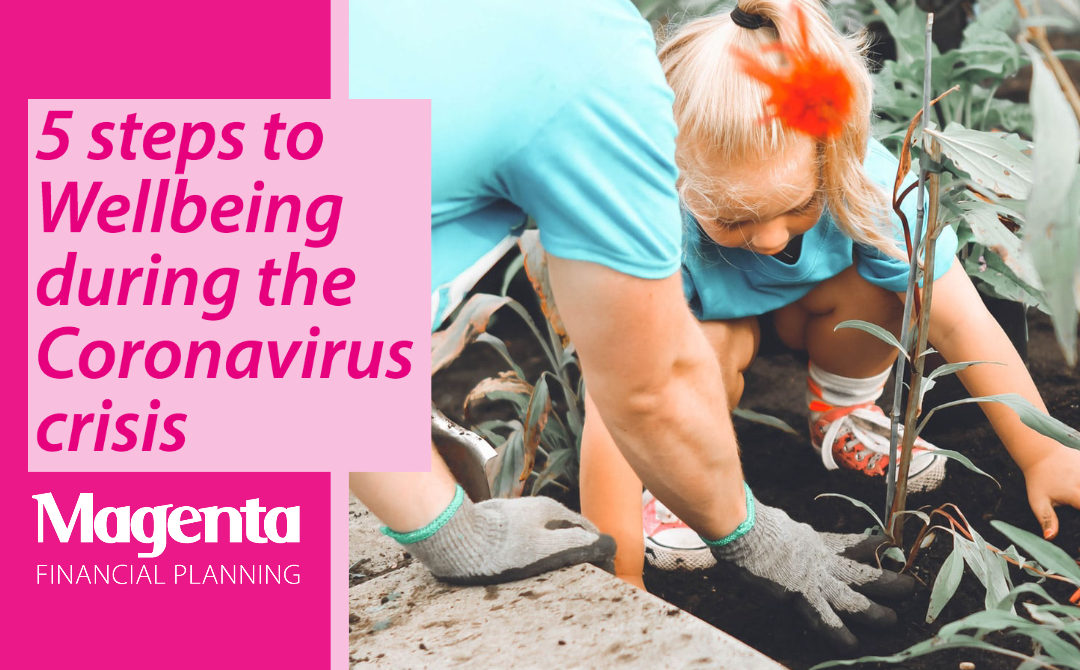At Magenta we have done a lot of work on wellbeing – financial wellbeing in particular but broadening the topic to cover all aspects of wellbeing to ensure our clients feel positive, can pursue their passions and get the most out of life.
We believe that financial wellbeing can be defined as:
- Having control over day-to-day, month-to-month finances;
- Having the capacity to absorb a financial shock;
- Being on track to meet your financial and lifestyle goals; and
- Having the financial freedom to make the choices that allow you to enjoy life and feel happy and secure.
We can help you with all of this of course, but during this difficult time and with many people in social isolation, we want to share 5 steps you can take to improve your overall mental health and wellbeing.
1. Connect with other people
Good relationships are important for your mental wellbeing. They can:
- help you to build a sense of belonging and self-worth
- give you an opportunity to share positive experiences
- provide emotional support and allow you to support others
Currently we are limited, but smart phones, tablets and computers make it possible to still have some interaction with other human beings.
You can talk over the garden fence, or over the road – possibly even to people you have never spoken to before!
There are lots of things you could try to help build stronger and closer relationships:
- If possible, take time each day to be with your family. Try arranging a Zoom call (https://zoom.us/) or use Skype (https://www.skype.com/en/) to share a cocktail or a cuppa at a fixed time.
- Call or video link friends you have not seen for a while.
- Switch off the TV to talk or play a game or do a puzzle with your immediate family.
- Organise a quiz that you can share with friends and family.
- Arrange to have lunch or afternoon tea with someone special (either by video or at a distance of 2m).
- Contact a friend or family member who needs support or company.
- If you are fit and well maybe volunteer to help the NHS (https://www.england.nhs.uk/2020/03/your-nhs-needs-you-nhs-call-for-volunteer-army/)
- Search and download online community apps to give you other ideas – we are seeing lots of great groups being set up on social media.
2. Be physically active
Being active is not only great for your physical health and fitness. Evidence also shows it can also improve your mental wellbeing by:
- Raising your self esteem
- Helping you to set goals or challenges and achieve them
- Causing chemical changes in your brain which can help to positively change your mood
We know that people who are used to regular exercise are finding it difficult at the moment, but we don’t need to spend hours in the gym to keep fit.
No matter how old you are you should try to do strengthening activities that work all the major muscles (legs, hips, back, abdomen, chest, shoulders and arms) on at least 2 days a week,
Use your furniture or a garden bench to help if necessary.
Exercises like skipping, squats, press ups, lunges and burpees are excellent but even just standing up and sitting down again a few times is better than nothing. There’s also some great online yoga and stretching guides.
Don’t let your body stiffen up – a few easy stretches every day, will keep you supple and strong.
3. Learn new skills
Research shows that learning new skills can also improve your wellbeing by:
- Boosting self-confidence and raising self esteem
- Helping you to build a sense of purpose
- Helping you to connect with others
Now more than ever, many of us have the opportunity to take a pause in our busy lives, but even if you still feel you don’t have time, or you may not need to learn new things, there are lots of different ways to bring learning into your life.
Some of the things you could try include:
- Try learning to cook something new. There are some great online recipe ideas.
- Try taking on a new responsibility in preparation for returning to full business as usual, such as mentoring a junior staff member or improving your presentation skills.
- Work on a DIY project, such as fixing a broken bike, garden gate or something bigger. There are lots of free video tutorials online.
- You could try learning a new language or a practical skill such as plumbing.
- Try new hobbies that challenge you, such as writing a blog, getting to grips with social media or learning to paint.
- Don’t waste time doing things that don’t interest you. It’s best to find activities you enjoy and make them a part of your life.
4. Give to others
Research suggests that acts of giving and kindness can help improve your wellbeing by:
- Creating positive feelings and a sense of reward
- Giving you a feeling of purpose and self-worth
- Helping you connect with other people
It could be small acts of kindness towards other people, or larger ones like volunteering in your local community.
Some examples of the things you could try include:
- Saying thank you to someone for something they have done for you.
- Asking friends, family or colleagues how they are and really listening to their answer.
- Spending socially distanced time with friends or relatives who need support or company.
- Offering to help someone you know with DIY advice or a work project.
- Volunteering in your community, such as helping with drug or shopping deliveries.
5. Pay attention to the present moment (mindfulness)
Paying more attention to the present moment can improve your overall wellbeing. This includes your thoughts and feelings, your body and the world around you.
Some people call this awareness “mindfulness”. Mindfulness can help you enjoy life more and understand yourself better. It can positively change the way you feel about life and how you approach challenges.
Just taking more time to appreciate the sights and sounds around you using all your senses can be extremely uplifting.
Look more closely at the flowers – notice how they are formed, see their bright colours, smell their lovely scent and touch their delicate petals.
Listen to the birds – wonder where they have come from, where are they going, watch their activity and appreciate their effort.
You may be surprised at how much better this makes you feel!

